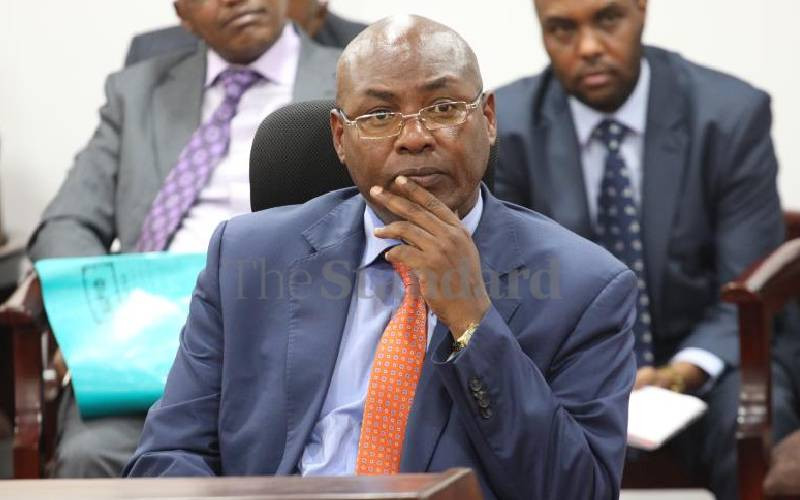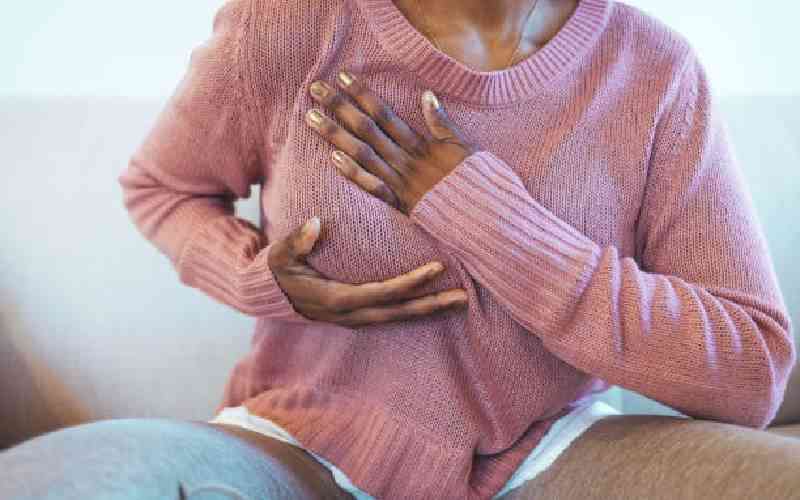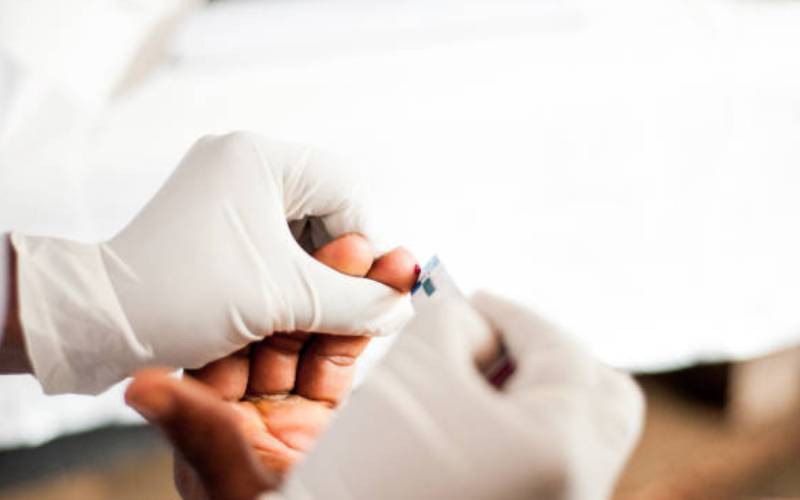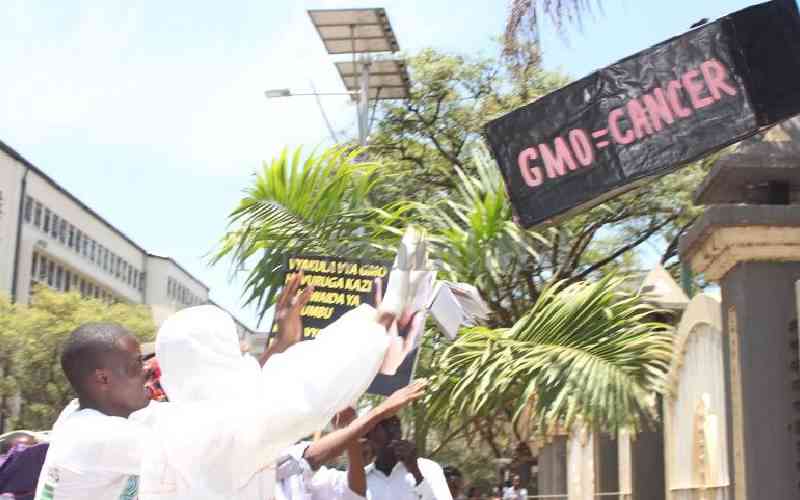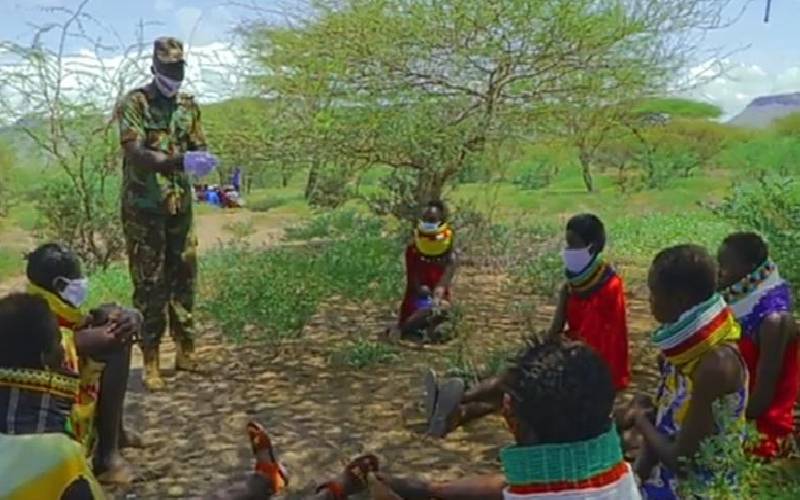
Police constable Kelvin Ochieng, popularly known as Blackson, educates locals at Kakuma about the coronavirus disease. [Fred Kibor, Standard]
A police officer based in Kakuma refugee camp has composed a song to create awareness among locals in Turkana County about Covid-19 pandemic.
Kelvin Ochieng, popularly known as Blackson released a song dubbed ‘Corona’ to educate locals about how to keep safe from contracting the disease.
The song has already been uploaded on YouTube channel, attracted over 3,000 views after it was launched six days ago.
Speaking to Standard Digital during an interview, Blackson said the song is meant to sensitise the locals about the virus, how it is contracted, how to prevent it and cautioning them there is no known cure for the disease.
“My song is to demystify the stereotypes about the disease and complement the government’s efforts in containing the spread of the disease,” he said.
The officer song is in Kiswahili to enable the locals to understand and also to ensure it can also be used in other parts of the country.
The song, he added, is intended to underscore the role of Kenya Police 'Utimishi Kwa Wote’ clarion call in also flatting the Covid-19 curve.
“At the moment there is a lot of mistrust between the police and the locals over the implementation of health protocol spelt out by the government. My song urges all people to observe them and not demonise police because they are also susceptible to the disease,” he noted.
He said like ordinary Kenyans, police are also human beings with feelings and when they cross paths with lawbreakers it is to enforce the law while observing rights, not to punish anyone.
Apparently, the police service has been on the spot for allegedly killing and maiming locals while implementing the disease containment measures.
Awareness
As of June 30, the county had confirmed only 15 positive cases, but Blackson says locals do not take the virus seriously, a move that pushed him to come up with the song.
“Many dismiss the disease that it is for whites and the old generation alone. It is as if they want to see one of their own dies from the disease to believe its existence which is very dangerous,” observes the 23-year-old police constable.
He said lack of awareness among people in the region motivated him to compose a song ostensibly to educate the masses on disease containment measures.
“With many challenges ranging from poverty, water, poor sanitisation among others, the rural population seem oblivious of the dangers they are exposed to if they don’t adhere to personal sanitisation and social distance,” he said.
He narrated that the locals in Turkana due to their social nature live in manyattas as clans but not a family which exposes them to a greater risk of contracting the disease.
“It is rare to find sanitisers among the population here and even regular hand washing is not strictly adhered to or even wearing of face masks by the locals. I saw a big danger and decided to come up with a song educating them of the need to observe the disease containment measures,” he said.
Music career
Bred and brought up in Lower Kibuye village- Homa Bay County, in a family of seven, Blackson started his singing career while Primary School.
“I used to sing in our church and in social gatherings. While in Mbita High school, I was part of the school choir catapulting me to participate in the national music and drama festivals. Later I participated in several talent searches held in Nyanza region before joining the police service in 2015,” he recalls.
Blackson said that Covid-19 is his maiden song to have been recorded in a studio despite owning a musical talent since childhood.
“My fellow officers urged me to record a song after seeing my passionate singing and community advocacy about the disease. They took me to Borntown video production studios here in Kakuma to shoot the song,” he said.
He said the song is popular among locals within the refugee camp as well as the surrounding local community.
Mary Ekuawan, one of the locals, praised the officers for being passionate about them to the extent of educating them while entertaining them.
"The officers do not come to arrest us but to teach us about the disease and how to keep safe," she said.
 The Standard Group Plc is a multi-media organization with investments in media platforms spanning newspaper print
operations, television, radio broadcasting, digital and online services. The Standard Group is recognized as a
leading multi-media house in Kenya with a key influence in matters of national and international interest.
The Standard Group Plc is a multi-media organization with investments in media platforms spanning newspaper print
operations, television, radio broadcasting, digital and online services. The Standard Group is recognized as a
leading multi-media house in Kenya with a key influence in matters of national and international interest.


